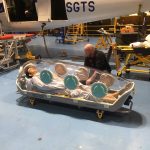

Loganair convert plane into air ambulance in COVID-19 response

A Loganair plane has been converted into an additional air ambulance aircraft, following calls to extend airlifting capability in the isles in response to the coronavirus outbreak.
The twin otter aircraft has been adapted to carry epishuttle isolation pods for the safe carriage of COVID-19 patients by air.
According to Loganair, more of these pods have been acquired and will be in service soon.
This comes after concerns were raised by island clinicians in Orkney, concerned about how anticipated needs might be met over the coming weeks and months.
Moves to expand air ambulance provision in the isles were announced by Scotland’s health secretary Jean Freeman, today, Wednesday. This came as welcome news to Orkney MSP Liam McArthur, who had previously highlighted these concerns. The moves were also welcomed by Highlands and Islands MSP Jamie Halcro Johnston.
The Loganair aircraft will be based at Glasgow Airport but can operate throughout Scotland. Loganair pilots will be operating the aircraft as usual, and late last week, all received a special briefing from the airline and the Scottish Ambulance Service on the nature of the deployment.
Work has continued in Loganair’s Engineering and Flight Operations teams at Glasgow over the weekend and into this week to ensure full readiness of the aircraft ahead of full mission readiness from Friday 3 April.
Loganair is also now working to convert a larger Saab 340 aircraft, capable of operating into all Highlands and Islands airports apart from Barra, to become an air ambulance with the capability to carry two Epishuttle pods and accompanying medical teams simultaneously. It is expected this aircraft will be available within the next seven days.
Loganair’s Chief Executive Jonathan Hinkles said: “The team effort to make this happen, moving from a concept to an operational solution in just a week, has been absolutely incredible.
“Between the SAS and Loganair teams, the concept, testing and training has all taken place and we’re also grateful for the support from the Civil Aviation Authority in progressing this project.
“Although the circumstances under which all of this work has been undertaken are ones that we’d never have wished to see, I’m heartened that the effort which has gone into this is truly admirable. We will support the Scottish Ambulance Service, the NHS and the island communities who rely on Loganair for their lifeline air services if and when our assistance is needed.”